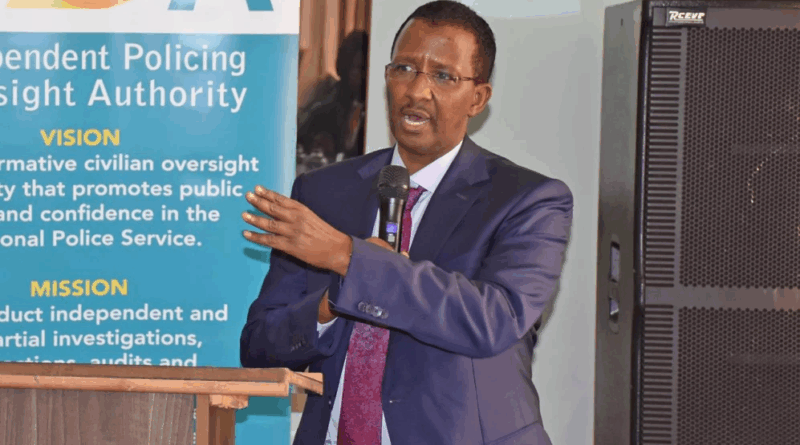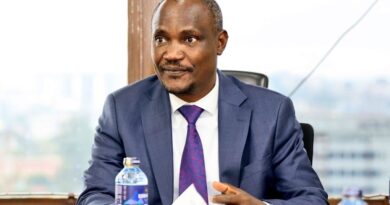IPOA Vows To Expose The Truth as It Forwards Police Misconduct Files to DPP
Nairobi, June 23, 2025 — The Independent Policing Oversight Authority (IPOA) has reaffirmed its commitment to justice by forwarding multiple case files of alleged police misconduct to the Director of Public Prosecutions (DPP), promising transparency and accountability. The authority, currently under intense public scrutiny, declared there would be “no cover-up” in the investigations surrounding police brutality and abuse of power.
This development follows widespread national outrage, sparked by the death in custody of teacher and blogger Albert Ojwang, which has since evolved into a symbol of the broader crisis of police violence in Kenya.
Public Complaints Surge, Trust Declines
Speaking at a press conference, IPOA Chairperson Ahmed Isaack Hassan noted that 75% of the complaints the Authority receives are filed directly by members of the public—underscoring a growing mistrust in internal police mechanisms to self-regulate and a demand for independent oversight.
“We will not be intimidated. We will let the investigations speak for themselves. There will be no cover-up,” Hassan stated, signaling a firm stance against interference.
The Ojwang Case: A Flashpoint for Reform
Albert Ojwang’s death in police custody has become a flashpoint in the national conversation around police accountability. The incident, which occurred in early June, involved suspicious circumstances that immediately drew attention from IPOA and the public. Following the incident:
- Seventeen police officers were named as persons of interest, with three arrests already made.
- Constable James Mukhwana, who was in charge of the cell where Ojwang was held, was the first officer arrested in connection with the death.
- Surveillance footage from the station was reportedly tampered with, leading to the arrest of a senior police officer and a civilian CCTV technician, suspected of obstructing justice.
- Public protests erupted in Nairobi and other major towns, with citizens demanding justice for Ojwang and broader accountability within the police force.
President William Ruto described the death as “heartbreaking and unacceptable,” and called on investigative bodies to act swiftly and transparently.
Controversy Over Evidence Handling
IPOA has also found itself under scrutiny in the same case. A phone belonging to retired Officer Commanding Station (OCS) Samson Talaam, seized as evidence, was allegedly used to send suspicious messages. This raised concerns about IPOA’s handling of sensitive evidence.
IPOA has denied any wrongdoing, stating that the device was stored as a secure exhibit and had not been tampered with while in their custody. The matter has been referred to the Directorate of Criminal Investigations (DCI), which is expected to submit a report by July 1, 2025.
Legal Milestone: IPOA’s Exclusive Mandate Affirmed
In a key legal development last month, the High Court affirmed that IPOA holds exclusive jurisdiction over investigations involving deaths and serious injury resulting from police actions. This ruling strengthens IPOA’s mandate at a time when its authority is increasingly challenged by law enforcement institutions and public pressure.
Despite securing this legal ground, IPOA must now prove that its operations are not only independent in theory but effective in practice.
Track Record and the Road Ahead
Between 2018 and 2024, IPOA submitted 773 case files to the DPP, which led to 30 convictions. While this shows that the institution has had some success, critics argue that its pace has been too slow, and the justice system is still perceived as biased in favor of security personnel.
To build on recent momentum, IPOA has pledged to:
- Prosecute officers who obstruct investigations under the IPOA Act.
- Strengthen partnerships with the National Police Service, DPP, judiciary, and civil society.
- Enhance transparency, especially in high-profile cases like Ojwang’s.
- Address public distrust through community engagement and regular updates on investigations.
A Nation at a Crossroads
The handling of police misconduct in Kenya has long been a contentious issue. For years, human rights groups have accused officers of engaging in extrajudicial killings, enforced disappearances, and other abuses—often without consequence. The case of Albert Ojwang has once again laid bare the urgency of reform.
| Key Metrics | Status |
|---|---|
| Complaints from public | 75% of total IPOA cases |
| Police officers under investigation | 17 (Ojwang case) |
| Arrests made so far | 3 |
| DCI report on evidence handling | Due by July 1, 2025 |
| IPOA case files sent to DPP (2018–2024) | 773 |
| Convictions secured | 30 |
Conclusion: A Defining Moment for Police Oversight
As IPOA attempts to hold rogue officers accountable while defending its own integrity, the institution is now at a defining moment. Whether it can overcome institutional resistance, public skepticism, and complex legal hurdles will determine if justice for Albert Ojwang—and others like him—is served.
The coming weeks will be critical. With files now in the DPP’s hands, a public awaiting answers, and a nation demanding change, IPOA’s resolve will either reaffirm public faith in oversight institutions—or confirm fears that justice in Kenya remains elusive for victims of police abuse.



